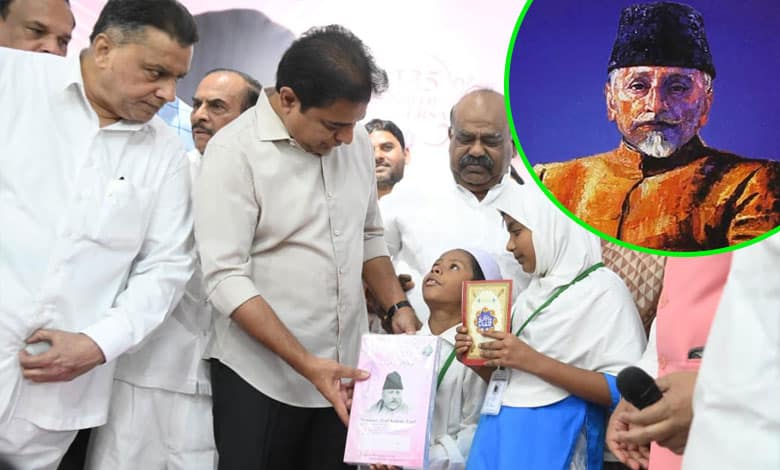KTR Distributes Notebooks and Study Materials to Poor Muslim Students on Maulana Abul Kalam Azad Jayanti
On the occasion of Maulana Abul Kalam Azad Jayanti, K. T. Rama Rao (KTR), Minister for Municipal Administration and Urban Development, distributed notebooks and study materials to underprivileged Muslim students at the Telangana Bhavan.

Hyderabad: On the occasion of Maulana Abul Kalam Azad Jayanti, K. T. Rama Rao (KTR), Minister for Municipal Administration and Urban Development, distributed notebooks and study materials to underprivileged Muslim students at the Telangana Bhavan. The event was a part of the state government’s initiatives to promote education and welfare among minority communities, especially Muslims, in line with the vision of Maulana Azad, India’s first Minister of Education.
Table of Contents
KTR expressed his happiness in organizing the celebrations at Telangana Bhavan, highlighting the significant contributions of Maulana Abul Kalam Azad in shaping India’s educational policies and advocating for the empowerment of marginalized communities.
Also Read: KTR criticizes Congress for unfulfilled promises to Backward Classes in Telangana
Telangana’s Commitment to Secularism and Inclusive Development
Reflecting on the state’s journey since its formation in 2014, KTR recalled how there were doubts and fears about potential communal tensions between Hindus and Muslims. However, under the leadership of Chief Minister K. Chandrashekar Rao (KCR), Telangana has become a model of communal harmony. He praised KCR for promoting the Ganga-Jamuni Tehzeeb (the cultural syncretism of Hindu and Muslim traditions), making Telangana a beacon of unity and tolerance in India.
KTR emphasized that, unlike mere promises made by others, KCR has genuinely worked towards inclusive development, ensuring that welfare programs benefit people of all faiths. The state government has provided support through various initiatives, such as Bathukamma sarees for women, Ramzan gifts, and Christmas presents for the underprivileged, fostering goodwill and unity among different communities.
Major Welfare Initiatives and Investments in Education
Under KCR’s leadership, Telangana has made remarkable strides in the education sector, particularly for minority students. KTR pointed out that over 200 residential schools have been established across the state, providing free education and boarding facilities to students from disadvantaged backgrounds. The state government has committed Rs. 1,20,000 annually for each student, benefiting approximately 1.4 lakh students.
Further highlighting the state’s commitment to minority welfare, KTR shared that under the Maulana Abul Kalam Azad program, the government has allocated Rs. 20 lakhs for the education of 2,751 minority students, with a total expenditure of approximately Rs. 438 crores on various educational initiatives.
Infrastructure and Religious Welfare Investments
KTR also mentioned the significant investments made for the development of religious and cultural infrastructure, including the allocation of 2 acres of land in Nampally valued at Rs. 100 crores for the construction of the Anisul Gurbanu memorial, as well as a Rs. 9 crore investment for the renovation of the Macca Masjid.
Additionally, the government is working on establishing an Islamic Center in Kokapet with a budget of Rs. 40 crores, reflecting the state’s commitment to preserving Islamic heritage and promoting community welfare.
Record Spending on Minority Welfare
KTR also highlighted that the Telangana government has invested a staggering Rs. 10,000 crores on minority welfare, a figure that is unprecedented in India’s history. This expenditure has been directed towards education, healthcare, employment, and social welfare programs for minority communities, with a particular focus on Muslim welfare.
Conclusion
KTR concluded by reiterating that under KCR’s leadership, Telangana continues to serve as an example of inclusive governance, where the welfare of every community, regardless of religion, is prioritized. The initiatives undertaken by the government, especially in the areas of education and minority welfare, showcase the state’s commitment to social justice and equality for all its citizens.
